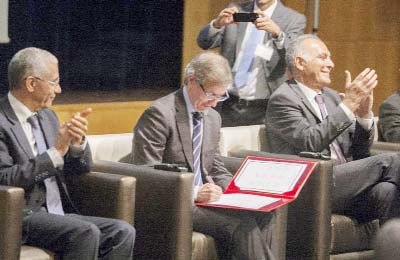
AFP, Rabat :
Libyan political parties and members of civil society initialled a UN-proposed peace accord in Morocco, despite the absence of a rival parliament not recognised by the international community.
“This is a step, but it is really an important step along the path to peace,” UN envoy Bernardino Leon said at a ceremony in the Moroccan resort of Skhirat marking the agreement.
The deal was backed by members of Libya’s internationally recognised parliament, based in the eastern port city of Tobruk, as well as representatives of political parties, municipalities and civil society groups.
Libya has been plunged into chaos since the 2011 overthrow of dictator Moamer Kadhafi, and now has two parliaments and governments vying for power.
No representatives attended from the rival parliament in Tripoli — controlled by Islamist militias since last year — which has rejected a UN proposal to resolve Libya’s political crisis by forming of a national unity government and holding new elections.
Leon said the door remained open to groups that did not attend, and added that remaining contentious issues could be discussed after the conclusion of the holy Muslim fasting month of Ramadan this month.
Among these issues are a call for “respecting the judiciary”, a possible reference to a Supreme Court decision invalidating the parliament in the east, which was elected in June 2014.
Libya has been split for nearly a year between an elected parliament in the country’s far east and an Islamist-led government backed by militias that seized the capital. Lacking central authority, the country has seen mounting extremist activity, including by the Islamic State group and al-Qaida-linked militants, and become a haven for migrant trafficking.
Leon said the door remained open for the Tripoli government to join the accord. Morocco’s Foreign Ministry said in a statement Saturday that the main sticking points were over which parties would run which institutions.
Libyan political parties and members of civil society initialled a UN-proposed peace accord in Morocco, despite the absence of a rival parliament not recognised by the international community.
“This is a step, but it is really an important step along the path to peace,” UN envoy Bernardino Leon said at a ceremony in the Moroccan resort of Skhirat marking the agreement.
The deal was backed by members of Libya’s internationally recognised parliament, based in the eastern port city of Tobruk, as well as representatives of political parties, municipalities and civil society groups.
Libya has been plunged into chaos since the 2011 overthrow of dictator Moamer Kadhafi, and now has two parliaments and governments vying for power.
No representatives attended from the rival parliament in Tripoli — controlled by Islamist militias since last year — which has rejected a UN proposal to resolve Libya’s political crisis by forming of a national unity government and holding new elections.
Leon said the door remained open to groups that did not attend, and added that remaining contentious issues could be discussed after the conclusion of the holy Muslim fasting month of Ramadan this month.
Among these issues are a call for “respecting the judiciary”, a possible reference to a Supreme Court decision invalidating the parliament in the east, which was elected in June 2014.
Libya has been split for nearly a year between an elected parliament in the country’s far east and an Islamist-led government backed by militias that seized the capital. Lacking central authority, the country has seen mounting extremist activity, including by the Islamic State group and al-Qaida-linked militants, and become a haven for migrant trafficking.
Leon said the door remained open for the Tripoli government to join the accord. Morocco’s Foreign Ministry said in a statement Saturday that the main sticking points were over which parties would run which institutions.

